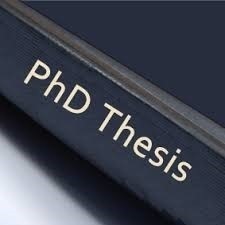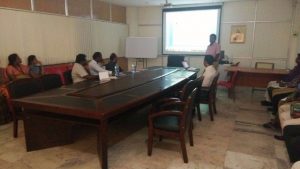 A PhD is considered as the most significant and highest degree in the world. It adds value to the CV of a person in terms of academic achievement, and if somebody wants to pursue career as academician, PhD degree is a must. PhD research certainly helps in improving the abilities to understand and solve problems, mastering a topic, increase confidence, bettering communication and gain skills that help in research areas.
A PhD is considered as the most significant and highest degree in the world. It adds value to the CV of a person in terms of academic achievement, and if somebody wants to pursue career as academician, PhD degree is a must. PhD research certainly helps in improving the abilities to understand and solve problems, mastering a topic, increase confidence, bettering communication and gain skills that help in research areas.
One may write a thesis without any trouble or hindrance, may feel that he/she has chosen of the best topics for thesis, but until it goes in hands of the referees (external examiners) and they oaky the thesis for degree of PhD, the final result cannot be concluded. Sometimes the referee may ask the candidate to change certain portion of the thesis, sometimes a thesis is returned for rewriting it, sometimes the data gets too old and therefore goes back for rewriting and at times due to poor language the thesis is returned.
Who can be the appropriate examiner? The examiners’ knowledge of the subject area is most important. His/her capability to scrutinize, assess, previous experience of PhD examining, and the assessment criteria by the University where the student is registered is moreover significant. The examiner gets his independence to judge quality of the research. If that freedom is not given, its better a person denies the responsibility of assessing. He or she should possess a PhD. Often, due to shortage of examiners, many thesis are kept pending in universities.
There are some good and some not-so-good examiners: The good ones assess the strength and weaknesses of the thesis; they are critical yet aware of the facts and figures mentioned in the thesis. They give due credit to the researcher and the supervisor, they are empathetic. Good examiners are experienced ones; they have their style of assessing a thesis and a good track record of doing justice to their job. Whereas, some supervisors believe in negative marking, they concentrate on finding weaknesses in a thesis. They take pride in finding mistakes and sending the thesis for amendment. Honestly, this happens when examiners lack subject knowledge and insight of assessing a thesis. An examiner becomes mature after assessing several theses. He/she gets hands on experience after assessing a number of theses. An examiner is supposed to check what contribution a thesis makes to society; the worth of the topic, uniqueness of the topic, style of presentation, findings, and the conclusions drawn by the researcher are important.
These are few things to remember:
Good document: The thesis must come out as a good readable document. The chapter schemes must be laid in logical and inter-reliant manner. The examiner must not be strained while reading a thesis. There must be natural flow in the written presentation. The examiner will be looking at whether you know the current scenario in the subject area. He will look for the evidences you have presented. The evidence can be in debate form, case form, news form. In short, the examiner looks at how familiar the researcher is with the subject.
Data has age: Remember that the data has an age. In today’s world when things are short lived, do not ignore the gaps in the data. If you have a purpose for choosing gaps, please mention it. The examiner looks out for new ideas, new methods, new modelling, and new strategies presented by the researcher. Make sure, that your thesis makes a significant contribution to original topic. The examiner must not miss your contribution in the chosen area.
Components of a good thesis: The examiners will assess the success of your thesis based on these components: the research problem or the research question; the significance for choosing the research problem; the chapter scheme; the relationship of your thesis to previous work done in the area; how your thesis builds on or adds to existing knowledge in the area; use of appropriate methodology; literature reviewed; conclusions and observations in regards to the research question; bibliography (is a list that goes at the end of a work of research writing. The list contains all the sources utilized in the thesis) there are marks for the bibliography, it goes to show quality of what you have picked up from existing theory, news, the books/journals etc. A thorough examiner checks the bibliography to establish that all major writers are included. If they are not, you may fail to meet a major credibility criterion.
The role of your supervisor is vital: He must tell at each step of the research what is wrong and how to correct it. You can use your supervisor as a sounding-board in all of the above areas. Think of your supervisor as the channel between you and the examiner. He/she can tell you what the examiners look for. In my opinion, the guide must have experience of examining few theses, so that he/she can tell the gaps. A mature and serious guide will keep showing you whether your thesis demonstrates the capacity to be developed systematically over the length of the dissertation; whether it is ready in all areas in terms of writing and presentation.
The viva: the external examiners often start out by trying to put the candidate at ease. They usually tell the candidate what they expect to see and hear in the presentation. Even in the case of a well-written thesis, the viva can be tough. The examiner looks forward to discuss the thesis topic in more details. It is good practice to approach the viva as a discussion among professionals. A good examiner will never let down or ridicule the student, or ask questions aggressively or dismiss responses without due consideration. The supervisor is an onlooker; rarely the examiner asks questions to the supervisor. But, presence of the supervisor is a must. If the viva turns tangential, the supervisor can give his/her opinion. At the end of the questioning, it is also good practice for examiners to ask the student if there are any questions they want to ask, or any points they want to make about the thesis, the examination process or supervision. A logically concluded viva must not last for more than an hour.
PPT Presentation: make a Power-Point presentation not exceeding 25 slides covering research problem, literature review, chapter scheme, what they cover, hypothesis, research methodology, findings and conclusions. After which, the examiner may ask questions, sometimes examiners ask questions during PPT Presentation itself. Take time to think before replying, remember to breathe and to speak practically slowly. Don’t become nervous, if the examiner criticises a point, don’t take it personally. Don’t become defensive. Instead, take the opportunity to talk about your research.
The questions that crop up in vivas are: What the thesis is about? What did you do? What did you find? Why does that matter? The time taken for completing the research, why that much time was taken? What was the experience of data collection, methodology, statistical tools and its effects etc? Remember to keep a clam mind, exuberance and liveliness matters. Wear a formal outfit.














































